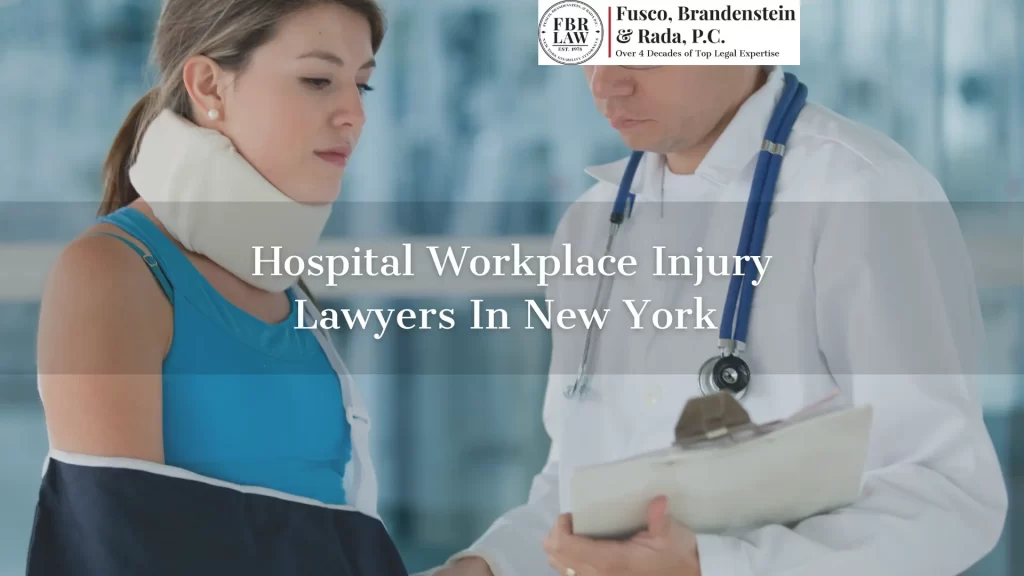
Per the Occupational Safety and Health Administration (OSHA), hospitals are among the most hazardous workplaces in the U.S. In 2019 alone, there were 221,400 work-related injuries and illnesses reported nationwide. This means there were 5.5 work-related injuries and illnesses for every 100 full-time employees.
Did you sustain a work-related injury while performing your duties at a hospital? If so, you might be eligible for workers’ compensation benefits. However, the claims and appeal processes can be time-consuming and overwhelming. The hospital workplace injury lawyers in New York from Fusco, Brandenstein & Rada, P.C. can protect your rights. We’ll work hard to get the necessary benefits to cover your medical care and lost wages.
Our legal team has over 40 years of experience in workers’ compensation. You’ll receive compassionate and caring service. We understand that your story is unique, and we listen. Call us today at 516-496-0400 or use our online contact form to reach out. You can set up a free consultation with one of our experienced workers’ compensation lawyers in New York.
Common Duties of Healthcare Workers
Hospital work is hazardous based on the common duties performed by workers. The range of work spans from nurses and doctors to lab and radiology technicians and janitorial staff. Much of the work requires repetitive actions on a daily basis.
For example, nurses can walk up to five miles during one 10-hour shift, and janitorial staff spends hours mopping floors and cleaning rooms. Workers using inappropriate equipment or poor body mechanics can sustain repetitive stress injuries. Some of the common duties and movements of healthcare workers include the following:
 Bending
Bending- Walking
- Scrubbing
- Lifting up to 60 pounds
- Transferring patients from bed to wheelchair
- Overhead work
- Computer work
- Long hours sitting
- Twisting and reaching repetitively
- Stretching
- Bathing patients
- Carrying medical devices
- Shifting patients in bed
- Assisting patients with necessary hygiene
Health Hazards Hospital Workers Face
Many of these activities can result in repetitive stress injuries to the knees, hips, elbows, and wrists. However, healthcare workers are also at risk for muscle and ligament sprains and strains. Hospital workers also commonly suffer back injuries, puncture wounds, and lacerations.
The OSHA study found that the greatest number of injuries were from overexertion. The Bureau of Labor Statistics, which records hospital injury rates, reached the same conclusion.
Many hospital injuries are from overexertion and body reactions. The second-highest number of hospital injuries and illnesses are from falls, slips, and trips. These incidents account for 24 percent of private and local government hospital injuries. However, the greatest number of injuries in state government hospitals is from violence. Acts of violence account for 45.9 percent of all injuries in these hospitals.
In 2019, the American Journal of Managed Care called violence against healthcare workers a “rising epidemic.” Each year there are 25,000 workplace assaults, and 75 percent of those happen in healthcare settings.
Nurses are at risk for work-related musculoskeletal disorders. These accounted for 44.1 percent of all injuries in nurses in 2016. Patients were the primary source, and the most affected part of the body was the back.
How to Stay Safe on the Job
Hospital workers face numerous challenges on the job. Staff members frequently come into contact with sharp objects. Workers who don’t handle these with care can sustain serious injuries. There’s the risk of a “dirty injury” when a used needle or scalpel punctures your skin. This can increase the potential for the transfer of blood-borne pathogens. Disposing of sharp instruments properly is the first step to avoiding injury.
 Hospital workers receive training in proper hand hygiene. They also clean and decontaminate instruments and use antiseptics and disinfectants between patients. These practices reduce the spread of infection and illness between patients and the healthcare staff. Take care of your skin since frequent washing can cause cracks that allow pathogens to access your body.
Hospital workers receive training in proper hand hygiene. They also clean and decontaminate instruments and use antiseptics and disinfectants between patients. These practices reduce the spread of infection and illness between patients and the healthcare staff. Take care of your skin since frequent washing can cause cracks that allow pathogens to access your body.
Busy nurses may fall into poor habits with body mechanics throughout the day. This can result in muscle, ligament, and joint injuries from transferring or lifting immobile patients. Hospital staff should be well-trained in using assistive devices. This includes electronic hoists, slings, and slip sheets.
It’s important to attend employee training to ensure you’re up to date with safety methods and techniques. When lifting patients, it’s wise to wait until you have an extra pair of hands to assist with the heavy lifting. Learn to report hazards on the job as soon as possible. These include broken equipment, spills, leaks, or potentially violent situations.
Seeking Workers’ Comp Benefits for an On-the-Job Injury or Illness
In New York, workers’ compensation insurance can cover medical expenses and lost wages. It also offers survivor benefits if an employee dies from a work-related injury or illness. The first step to seeking compensation is to report the injury or illness to your employer. Hospitals have policies and procedures that cover reporting a work-related accident or illness. This includes filling out an incident report signed by the employee and employer. Be sure to take a copy of the form with you.
You must notify your employer of the incident within 30 days. However, it is best to do it before leaving your shift or as soon as possible. If you wait longer than 30 days, you can lose the right to any benefits. Next, you must file an employee claim with the workers’ compensation board. This form is called a C-3. You must file it within two years of the accident or two years after learning the disease or condition was work-related.
The employer’s workers’ compensation insurance company will investigate the claim. Then, it will either deny it, pay it, or ask for more information. If the claim gets denied, you have options for filing an appeal. This process can be overwhelming and complicated when recovering from an injury or illness.
Contact Fusco, Brandenstein & Rada, P.C. for a free consultation. We’ll discuss your case and advise you on your best move forward. When you hire us to represent your interests, you can rest assured we will protect your rights.
How Fusco, Brandenstein & Rada, P.C. Can Help
The compassionate team at Fusco, Brandenstein & Rada, P.C. understands that pursuing workers’ comp benefits is stressful. It is difficult to meet the necessary deadlines and gather the right information when recovering from an injury or illness. The financial struggles of being out of work and paying medical expenses can be stressful. When you hire our legal team, we’ll aggressively fight to protect your rights and ensure you get the benefits you deserve.
Remember that your first consultation with our team is free. Attorney fees in a workers’ compensation case are set by the court and paid by the insurance company after we win an award for you. This means you never pay for our services directly or out of your pocket. Instead, the insurance company pays the bill if we win your case.
Call Fusco, Brandenstein & Rada, P.C. today to schedule your free consultation. Discover how you can depend on our experienced and resourceful legal team to support you through this process. Call 516-496-0400 or contact us online today.
Related Reading:
